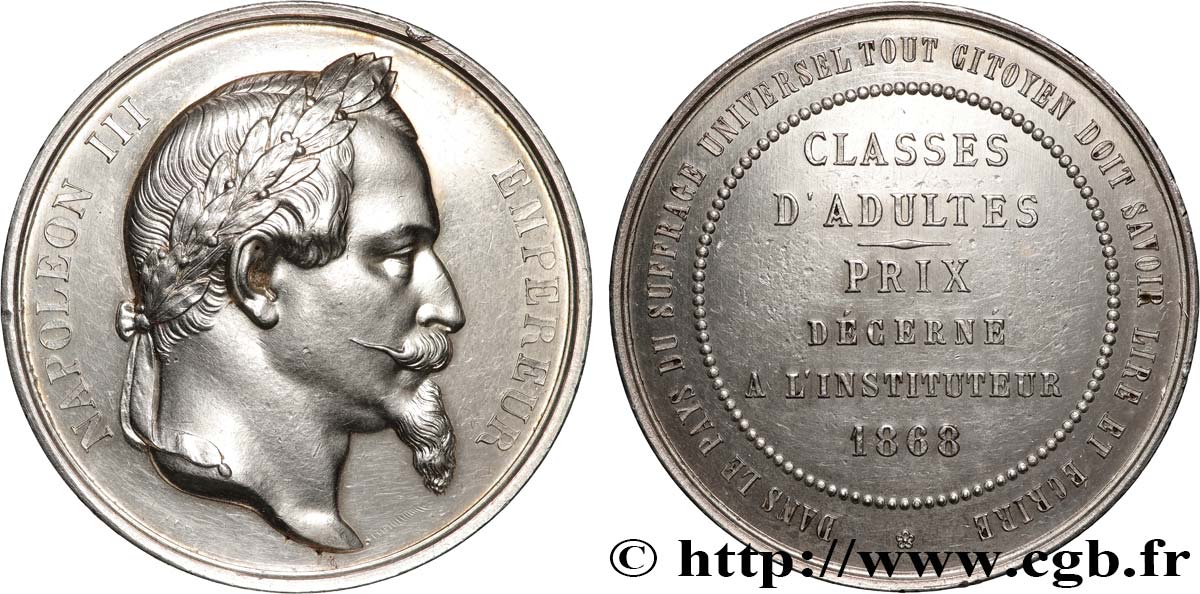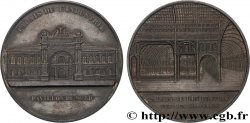fme_920707 - SECOND EMPIRE Médaille de récompense, cours pour adultes
85.00 €(Approx. 88.40$ | 70.55£)
Quantity
Add to your cart

Type : Médaille de récompense, cours pour adultes
Date: 1868
Metal : silver
Diameter : 45,5 mm
Orientation dies : 12 h.
Engraver BOVY Antoine (1795-1877)
Weight : 49,99 g.
Edge : gravée : PRIX OFFERT PAR LE DEP.T DE L’AISNE, A M.R GAIN. INSTITUTEUR A DANZY + abeille ARGENT
Puncheon : abeille ARGENT
Coments on the condition:
Médaille ayant été nettoyée, présentant quelques coups et rayures, notamment au revers. Légère usure sur certains hauts reliefs
Obverse
Obverse legend : NAPOLÉON III - EMPEREUR.
Obverse description : Tête laurée à droite de Napoléon III, signé : BOY F..
Reverse
Reverse legend : (FLEUR) DANS LE PAYS DU SUFFRAGE UNIVERSEL TOUT CITOYEN DOIT SAVOIR LIRE ET ÉCRIRE // CLASSES / D’ADULTES / - / PRIX / DECERNE / A L’INSTITUTEUR / 1868.
Reverse description : Légende en 10 lignes horizontales et circulaire autour.
Commentary
La médaille a été décernée à l’instituteur de Danzy, Monsieur Gain, en 1868.
Une phrase du discours de l'Empereur suscita quelque souci “Dans un pays de suffrage universel tout citoyen doit savoir lire et écrire.” C'était au ministre de l'instruction publique Duruy qu'il appartenait de réaliser ce desideratum, et cela ne lui était pas facile. Ses collègues le considéraient un peu comme un suspect. Quand il arrivait, les conversations politiques s'arrêtaient. Sa position eût été intenable sans l'appui constant de l'Empereur. Il avait la précaution de ne prononcer aucun discours sans le lui soumettre en épreuves, et aucun d'eux ne lui fût renvoyé avec une correction ou une rature..
Une phrase du discours de l'Empereur suscita quelque souci “Dans un pays de suffrage universel tout citoyen doit savoir lire et écrire.” C'était au ministre de l'instruction publique Duruy qu'il appartenait de réaliser ce desideratum, et cela ne lui était pas facile. Ses collègues le considéraient un peu comme un suspect. Quand il arrivait, les conversations politiques s'arrêtaient. Sa position eût été intenable sans l'appui constant de l'Empereur. Il avait la précaution de ne prononcer aucun discours sans le lui soumettre en épreuves, et aucun d'eux ne lui fût renvoyé avec une correction ou une rature..








 Report a mistake
Report a mistake Print the page
Print the page Share my selection
Share my selection Ask a question
Ask a question Consign / sell
Consign / sell
 Full data
Full data









